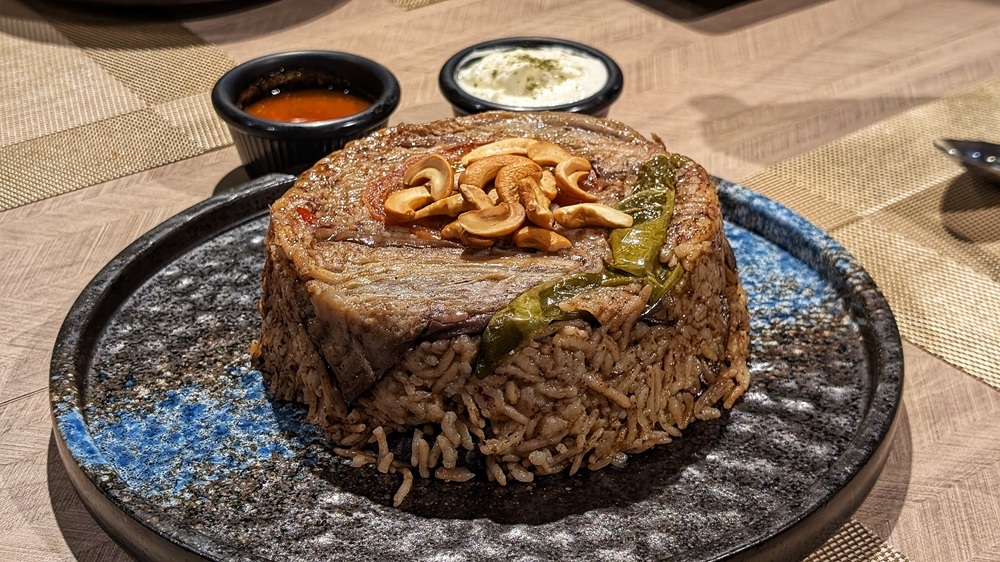PETALING JAYA, Aug 7 — One of the first things you notice when you step into Al-Sham, an Arabian restaurant that opened in Damansara Kim last December, is a small bottle of olive oil placed on every table.
It isn’t there to suggest anything Italian, despite the presence of pizza and pasta on the menu.
It is there for you to use as you please, but also doubles as a marker of the restaurant’s identity, and of its chef and owner, Chef Ahmed, who is Palestinian and hails from the city of Khan Yunis in Gaza.
Contrary to popular perception, Italy does not hold a monopoly on olive oil as cultural identity.
For Palestinians, olive oil and the trees from which it comes are more than just an important agricultural product.
It is also a symbol of Palestinian culture, of heritage, and of belonging to the land.
Yasser Arafat, the first President of Palestine, famously told the United Nations General Assembly in 1974 that the olive tree is “a living reminder that the land is Palestinian.”
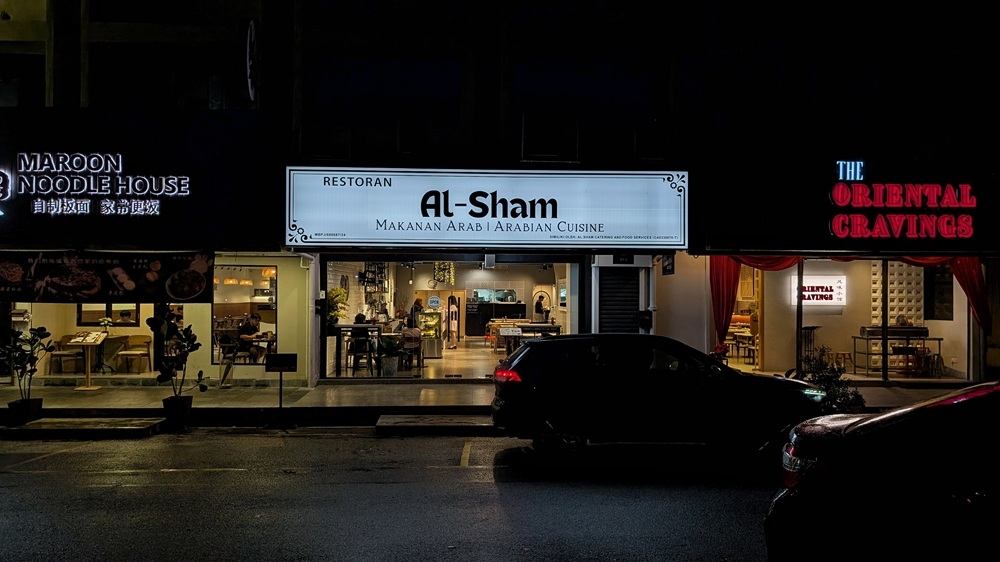
Look for the white sign along the row of shops. — Picture by Ethan Lau
Yes, Al-Sham describes itself as serving “Arabian cuisine”, with the menu naturally showing a strong Levantine influence and featuring all the classics: a wide range of meze (small dishes), including hummus, baba ghanoush, falafel and tabbouleh, along with the familiar meaty staples of mandi, shawarma and kebabs.
And yes, you could come here and have a perfectly good, probably great meal, and oafishly stuff yourself with pita bread and kebabs.
But then Al-Sham would be just another Arab restaurant to you, and you would be sorely missing the point.
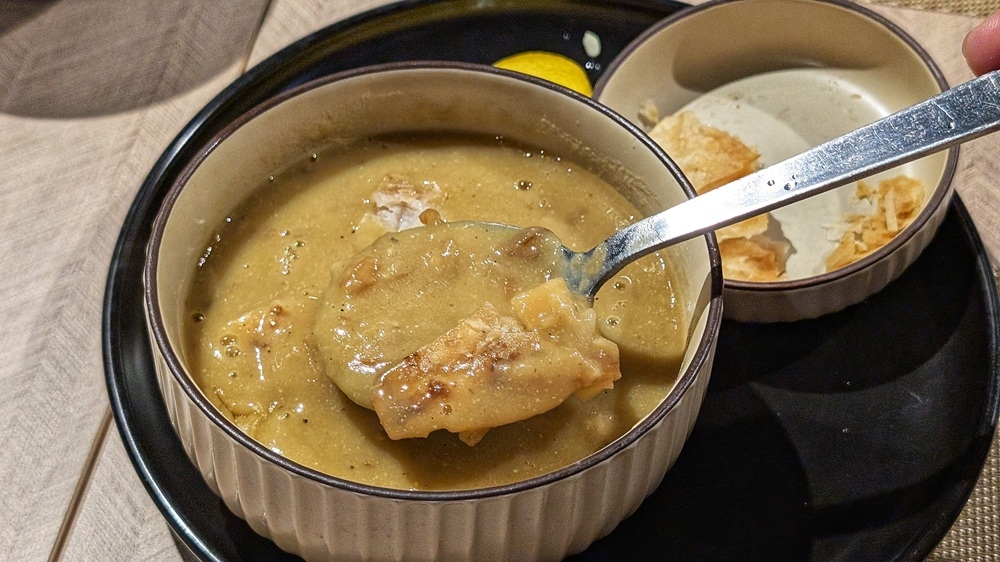
Lentil soup at Al-Sham comes with a healthy squeeze of lemon and fried ‘pita’ for texture. — Picture by Ethan Lau
A meal at Al-Sham should start with the lentil soup (RM9), smooth and comforting, with a typically Levantine addition of a squeeze of lemon juice to cut through the richness.
Toss in the strips of fried pita for a flaky contrast. Lemon and all its citrusy character show up elsewhere, too.
A modern riff on the classic salad, the kale tabbouleh (RM19) swaps parsley for finely chopped kale, while retaining the rest of the traditional ingredients: onions, mint, tomatoes, and bulgur, a type of cracked wheat typical of the cuisine.
It’s bright and refreshing, as most Levantine meze is, but with a mildly bitter edge that sets it apart.
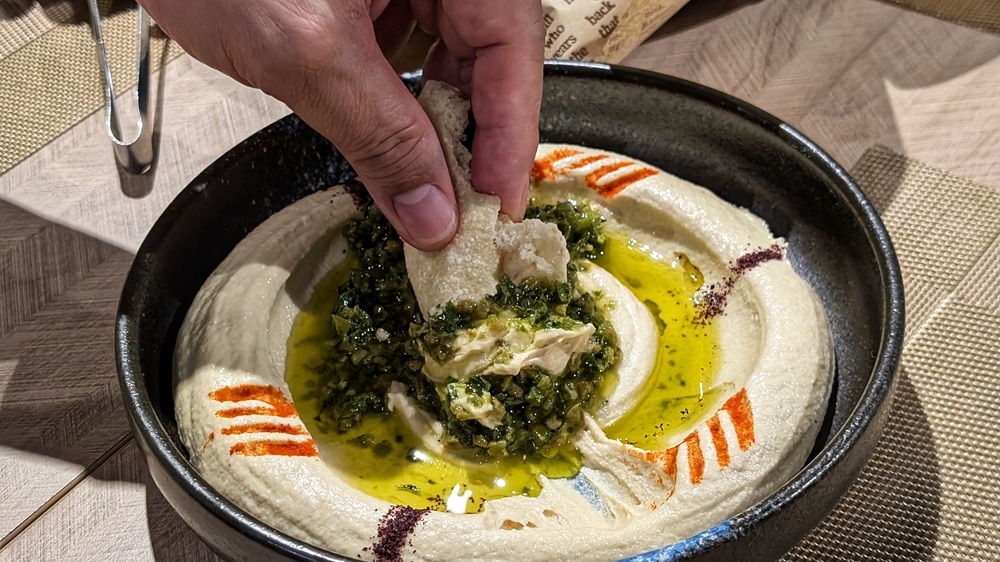
The signature ‘hummus’ is lathered in olive oil and sprinkled with paprika and sumac. — Picture by Ethan Lau
No table of meze would be complete without pita bread and a few dips. The signature hummus (RM15) is made in classic Palestinian fashion: silken with tahini, crowned with a pool of olive oil in the centre, and finished with a light dusting of paprika and sumac around the edges, the latter adding even more lemony sharpness to the equation.
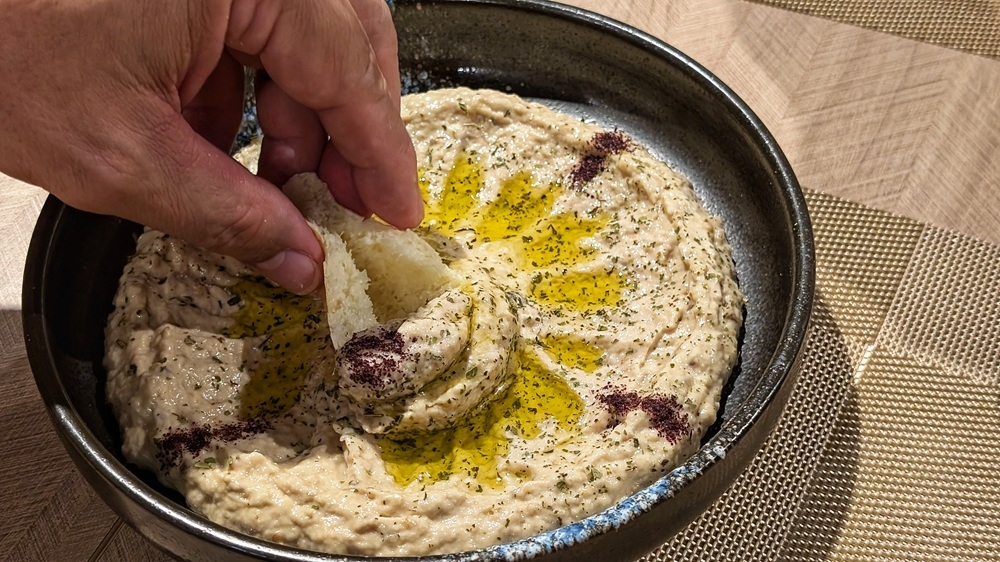
‘Mutabbal’ is similar, but creamier than ‘baba ghanoush’ thanks to the inclusion of ‘tahini’. — Picture by Ethan Lau
That same tart, citrusy spice shows up in the mutabbal (RM15), a thick, creamy dip of smoky roasted eggplant, made richer and smoother than baba ghanoush with the addition of tahini and olive oil.
Tear off a piece of hot, puffy pita and drag it across either plate for a rich, thick delight.
Stuffed grape leaves (RM19) are where one begins to see more specific markers of Palestinian cuisine.
Similar stuffed dishes are found throughout Ottoman culinary tradition, but Palestinians refer to this particular version, made with spiced and herbed rice wrapped in grape leaves, as warak dawali.
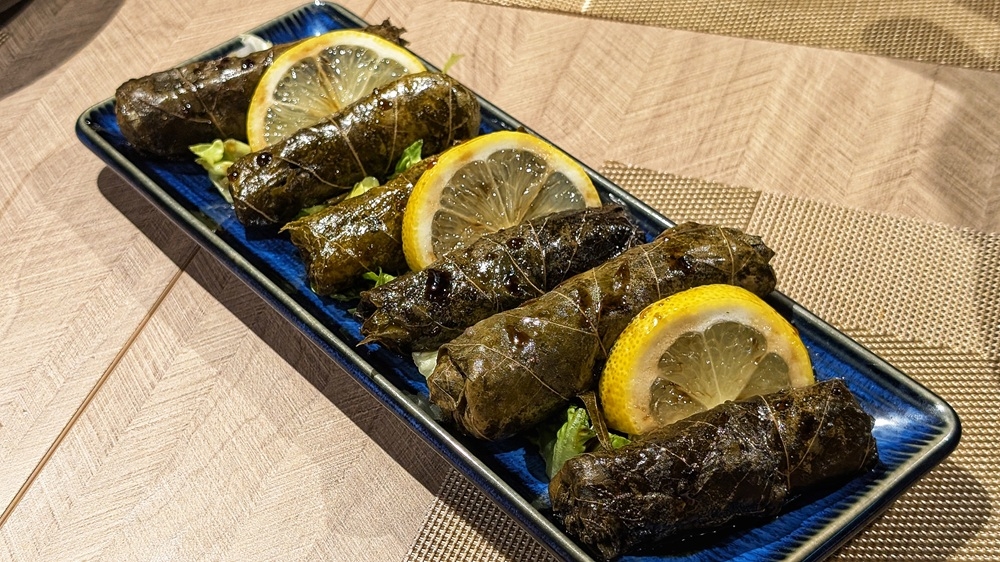
Stuffed grape leaves, filled with rice but flavoured with pomegranate molasses and lemon. — Picture by Ethan Lau
Variants with meat are typically served as a main dish for large gatherings, while this vegetarian version is more often an appetiser, as it is here.
Served with a drizzle of pomegranate molasses and slices of lemon, each parcel is a sweet and tart bundle of sticky, soft rice, bursting with the fragrance of grapes.
And finally, the main event. A meal here is incomplete without it, more so than mandi, shawarma or kebabs. Maqluba (RM45).
To come to Al-Sham and skip this is to miss the point entirely. Mandi, shawarma and kebabs can be found at any number of Arab restaurants, but maqluba is rarely seen on menus here, and it is central to Palestinian identity.
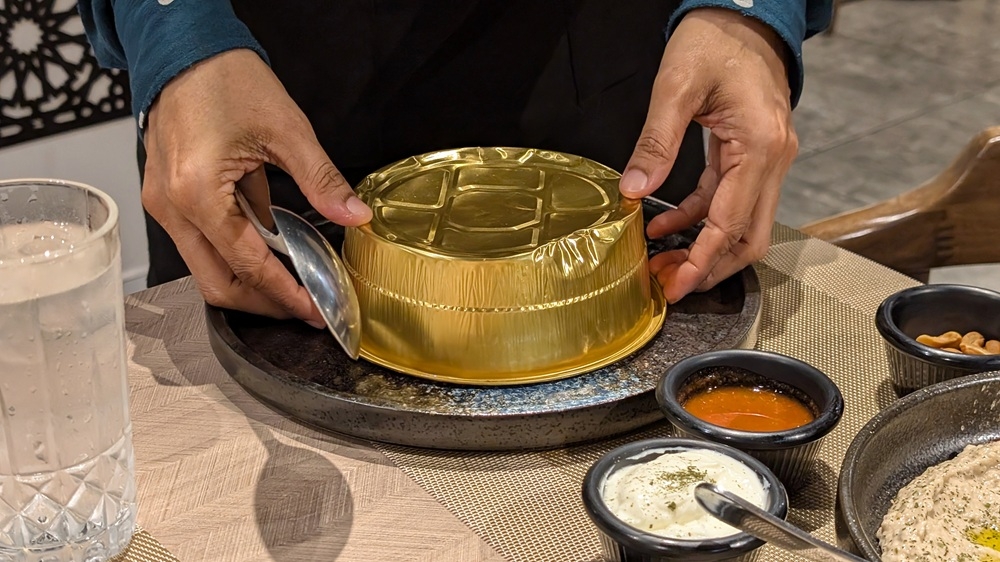
The ‘maqluba’ is flipped and presented tableside. — Picture by Ethan Lau
It also comes with not a small amount of theatricality. Maqluba means “upside down” in Arabic, and when an order arrives, it does so upside down.
A server taps the aluminium bowl a few times to loosen the contents, then lifts it away to reveal a mound of rice, eggplant, tomatoes, potatoes and lamb, finished with a scattering of cashews over the top.
A first whiff hits with the heavy scent of clove. The next brings cinnamon. These two warm, earthy spices form the backbone of the dish, which is best enjoyed with a spoonful of cool, tangy yoghurt.
Aside from the rice, the lamb is slow-cooked until tender and yielding, while the eggplant collapses into a soft, almost sultry mush.
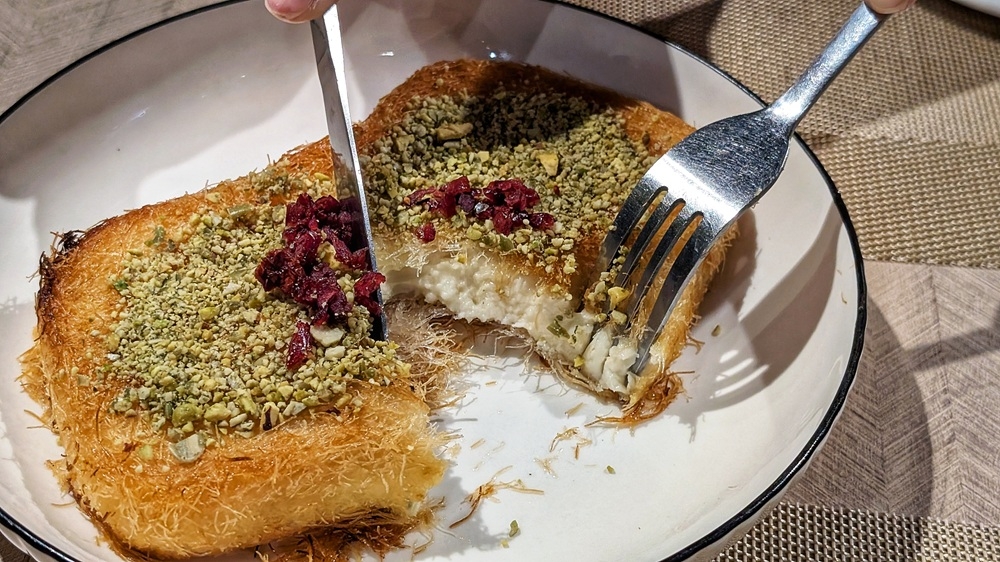
The ‘kunafa’ here is filled with a neutral, bouncier cream curd, instead of gooey cheese. — Picture by Ethan Lau
It’s difficult not to feel a deep sense of satisfaction and contentment after a meal here, especially when it ends with a freshly baked cream kunafa (RM21).
There are many varieties of this dessert, but the most recognised version, filled with salty Nabulsi cheese, originates from the Palestinian city of Nablus.
Here, instead of a brined, gooey cheese, it is filled with a light cream curd that has a bouncier texture. A sprinkling of dried cranberries and crushed pistachios gives way to crisp kadayif, wrapped around the neutral-tasting curd that allows the attar, a syrup scented with rose water, to truly shine.
Al-Sham Arabian Cuisine
27, Jalan SS20/11,
Damansara Kim,
Petaling Jaya, Selangor
Open daily, 11am-11pm. Closed from 1-2.30pm on Fridays for prayers.
Tel: 018-589 1704
Facebook: Al-Sham Arabian Cuisine
Instagram: @alsham.malaysia
* This is an independent review where the writer paid for the meal.
* Follow us on Instagram @eatdrinkmm for more food gems.
* Follow Ethan Lau on Instagram @eatenlau for more musings on food and self-deprecating attempts at humour.


